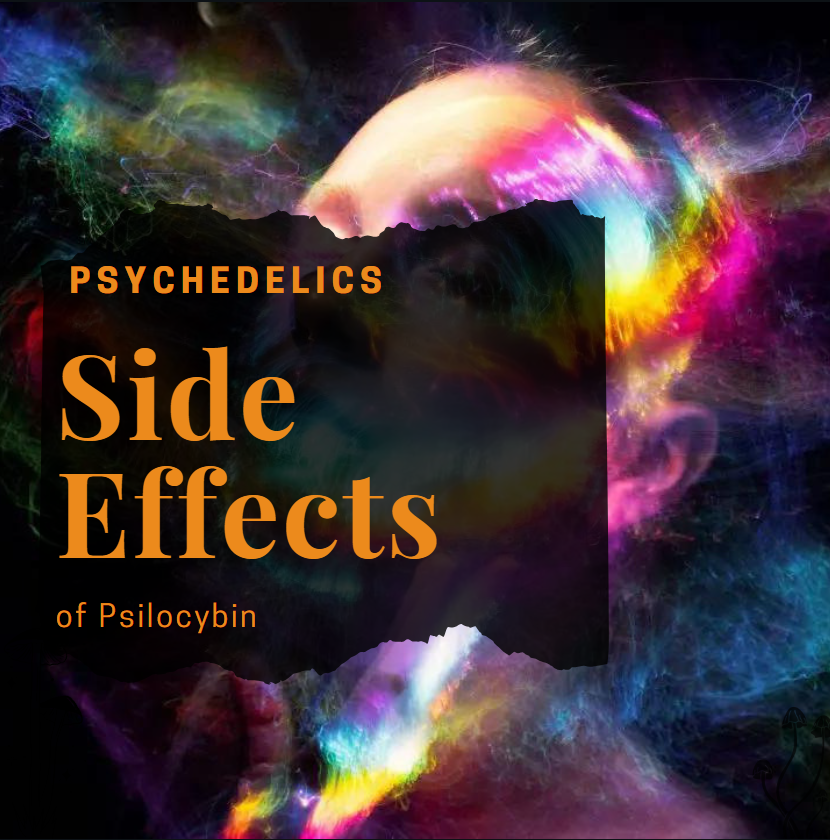
Upon ingestion, psilocybin’s effects typically manifest within 30-60 minutes, peaking at around 90 minutes and lasting up to 6 hours, though some individuals may experience prolonged effects. Various factors, including dosage, method of ingestion, tolerance levels, body weight, age, and recent food intake, can influence this timeline.
Let’s explore the common physical and mental side effects associated with magic mushrooms. For a more comprehensive understanding, we’ll also delve into how psilocybin interacts with specific medications and health conditions, along with its therapeutic benefits.
Positive Effects:
Enhanced visual acuity
A sense of lightness
Eureka moments
Vivid dreams
Reduced anxiety
Alleviated depression
Relaxation
Mood enhancement
Increased creativity
Enhanced empathy for self and others
Improved quality of life
Deepened introspection
Expanded consciousness
Connection to a higher power
Heightened appreciation for the planet
Enhanced self-awareness
Negative/Uncomfortable Effects:
Nausea
Vomiting
Drowsiness
Dry mouth
Headache
Increased heart rate
Elevated blood pressure
Fluctuations in body temperature
Persistent yawning
Anxiety
Nervousness
Paranoia
Confusion
Rare, Severe Cases:
Delirium
Seizures (More common in individuals with a family history of epilepsy)
Hallucinogen Persisting Perception Disorder (HPPD)
Tolerance, Dependence, and Withdrawal
Regular use of psilocybin can lead to tolerance, requiring higher doses to achieve the same effect. Tolerance may develop in as little as 4 days. To reset tolerance, abstain from mushroom use for about a week.
While psilocybin does not cause physical dependence, psychological dependence may occur with regular use. Abrupt cessation may result in psychological withdrawal symptoms, necessitating gradual adjustment.
Can Psychedelic Therapy Cause Psychosis?
Though psychedelic therapy shares similarities with psychosis, it occurs within a supportive environment guided by professionals. Unlike traditional responses to psychosis, which involve medical intervention, psychedelic therapy emphasizes compassion and support.
Drug Interactions with Psilocybin
Psilocybin interacts with various substances, including prescription, over-the-counter, and recreational drugs. These interactions can lead to adverse effects and should be approached cautiously.
Antidepressants: Combining psilocybin with SSRIs or MAOIs can lead to serotonin syndrome, a potentially life-threatening condition.
Mood Stabilizers: Mixing mood stabilizers like lithium with psilocybin may increase the risk of seizures, psychosis, and negative experiences.
Stimulants: Concurrent use of stimulants with psilocybin can elevate heart rate, blood pressure, and body temperature, with a heightened risk of cardiovascular complications.
Alcohol: Combining alcohol with psilocybin intensifies negative effects and increases the risk of accidents.
Antihistamines: Psilocybin may enhance sedative effects when taken with antihistamines, leading to impaired coordination and hallucinations.
Other Drugs: Cannabis, MDMA, and other recreational drugs may interact unpredictably with psilocybin, potentially causing adverse effects like increased heart rate and hallucinations.
This list is not exhaustive, and individuals should consult healthcare providers before using psilocybin, especially if taking other medications. Understanding potential interactions and risks ensures safe and effective use of psychedelics.
